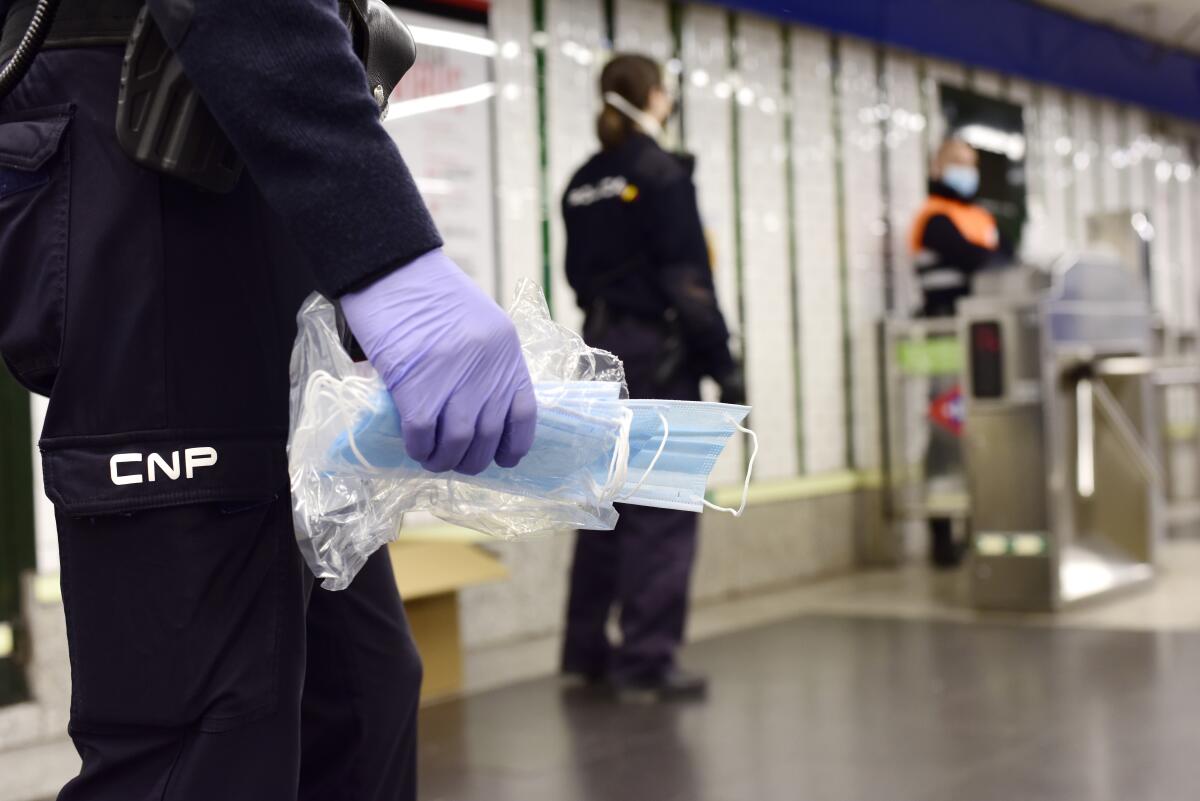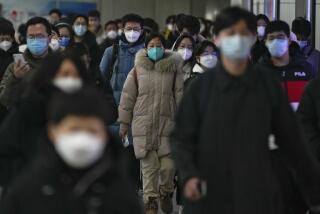Construction crews back on the job in Spain, but rebuilding work life won’t be simple

- Share via
GIJON, Spain — It was the first day back at work in more than four weeks for Alberto Menendez, a construction company owner in the northern Spanish city of Gijon.
But Monday was hardly a normal day on the job.
In its first tentative move to ease coronavirus restrictions that were imposed last month across much of Europe as the outbreak took hold, the Spanish government has begun allowing construction and factory employees to go to back to work under strict safety guidelines.
It was a small first step toward restarting a national economy devastated, like others around the world, by the outbreak of COVID-19, the disease caused by the virus.
As part of the leading edge of Spain’s partly reconstituted workforce, Menendez — like others across the country and continent — confronted unexpected obstacles as he sought to bring his shuttered business back to life.
Scrambling to find a construction crew on only a few hours’ notice, he was able to mobilize only half of his usual 10 workers on Monday. To get to the site of his current job, an office building renovation in the city center, he had to pass through two security checkpoints and show documents proving his company was legitimate and his work was qualified under the slightly- relaxed new rules.
The center of normally bustling Gijon, a vibrant coastal city of more than a quarter-million people that is the hub of the northern region of Asturias, was all but deserted. Accustomed to the flow of pedestrians and roar of vehicle traffic, Menendez found the stillness a little unnerving.
“It doesn’t feel normal,” he said.
At the site, his workers quickly realized they didn’t have all the tools and building materials they needed. A nearby building supply store was open, but it had long lines and limited stock.
“It’s a real mess,” said Menendez, who has been in the building trade since 2005. “You come back, but you have no materials, and there are problems in the supply lines.”
Spanish authorities’ actions are being echoed, albeit on a small scale, elsewhere across Europe.
In hard-hit Italy, a few types of shops previously closed as “nonessential” — with wares including books, stationery and children’s clothing — were allowed to open on Tuesday. In Austria, shoppers in face masks were able to patronize garden centers and hardware stores.
Coronavirus experiences add to pressure for healthcare workers
But with Spain still shocked by the scope of its coronavirus ordeal — more than 18,000 dead as of Tuesday, with hundreds still dying daily — some worried that the government was moving haphazardly, and perhaps too quickly for safety.
“They have planned all this badly,” said David Gallego, head electrician at Vital Álvarez Buylla Hospital in the city of Mieres, about a half-hour’s drive from Gijon. “Maybe we can get out little by little, but it’s too soon.”
As Gallego headed to work, police officers stopped cars and offered face masks to anyone approaching — but also demanded proof of motorists’ reasons for being out.
Even with the limited new signs of activity, Gijon still had an eerily empty air. There were few people in what would normally be a crowded light rail station, patrolled by police and volunteers.
Two friends who met at the station were reprimanded for standing too close while talking, despite loudspeaker warnings about maintaining distance.
Esther Cabazos, a caregiver for an elderly woman, said she was afraid of being out in public, but she needed her livelihood.
“Fear? Well, yes, but if the virus doesn’t kill us, we’ll starve to death,” she said.

Even with this limited easing of confinement rules, most Spaniards are still sheltering at home, and across the country, transportation links are sparse.
At Oviedo airport, signs warned that only essential travel was allowed, and flights connecting the Asturias region to the population centers of Madrid and Barcelona were grounded until May.
In Gijon, Menendez wondered when the lively city he knew would return to some semblance of itself. The shelter-at-home rules that still apply to the vast majority of activities will continue at least until April 26.
So, for at least that long, he and his construction crew will continue to find themselves nearly alone in the heart of the city.
“It’s the closest thing to a curfew,” he said.
More to Read
Sign up for Essential California
The most important California stories and recommendations in your inbox every morning.
You may occasionally receive promotional content from the Los Angeles Times.












